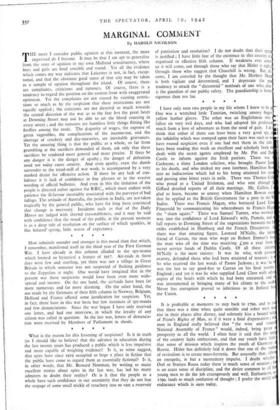MARGINAL COMMENT
By HAROLD NICOLSON
THE more I consider public opinion at this moment, the more impressed do I become. It may be that I am apt to generalise from the state of opinion in my own Midland constituency, where boys and girls are bred sensible and sound. Yet all the evidence which comes my way indicates that Leicester is not, in fact, excep- tional, and that the obstinate good sense of that city may be taken as a sample of opinion throughout the island. Of course, there are complaints, criticisms and rumours. Of course, there is a tendency to regard the position on the eastern front with exaggerated optimism. Yet the complaints are not caused by existing restric- tions so much as by the suspicion that these restrictions are not equally applied ; the criticisms are not directed so much towards the central direction of the war as to the fear lest the great heart at Downing Street may not be able to set the blood coursing in every artery ; and the rumours are harmless little things flitting like fireflies among the reeds. The disparity of wages, the expense of green vegetables, the complications of the income-tax, and the shortage of crockery and day-nurseries, are inevitable grievances. Yet the amazing thing is that the public as a whole, so far from grumbling at the sacrifices demanded of them, ask only that these sacrifices be rendered more general and more precise. If there be any danger it is the danger of apathy ; the danger of defeatism need not today cause anxiety. And even apathy, even the dumb surrender to the tread-mill of war work, is accompanied by a very marked desire for offensive action. If there be any lack of con- fidence it is lack of confidence in fine phrases or in the evasive wording of official bulletins. And even in this the irritation of the people is directed rather against the B.B.C., which must endure with patience the ill-favour invariably associated with the purveyor of bad tidings. The attitude of Australia, the position in India, are not taken tragically by the general public, who have for long been convinced that change is necessary. Incidents such as that of the Daily Mirror are judged with shrewd reasonableness, and it may be said with confidence that the mood of the public at the present moment is as a deep tide of resolution on the surface of which sparkles, in this belated spring, little waves of expectancy.


























 Previous page
Previous page